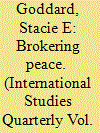|
|
|
Sort Order |
|
|
|
Items / Page
|
|
|
|
|
|
|
| Srl | Item |
| 1 |
ID:
118157


|
|
|
|
|
| Publication |
2012.
|
| Summary/Abstract |
After over 20 years of fighting in Northern Ireland, the Belfast Agreement of 1998 has successfully implemented a power-sharing agreement. Belfast was not the first attempt at a peaceful settlement; indeed, some scholars count as many as seven prior peace attempts in Northern Ireland, the most significant being the Sunningdale Agreement of 1973. Why was it that politicians successfully negotiated the peace in 1998, while these prior attempts failed? Drawing from social network theory, I argue that the Belfast Agreement succeeded, not because of a change of interests or disappearance of spoilers, but because of the presence of brokers at the bargaining table. Brokers, in particular, have the capacity to legitimate settlements-to frame settlements in such a way that they appear consistent with principles held by multiple coalitions. As a result, brokers are both more likely to build a winning coalition for a settlement, as well as marginalize spoilers who seek to undermine the peace.
|
|
|
|
|
|
|
|
|
|
|
|
|
|
|
|
| 2 |
ID:
080666


|
|
|
|
|
| Publication |
2008.
|
| Summary/Abstract |
This essay explores reactions to the 1996-1997 incarceration of R is n McAliskey, a young Irish republican, pregnant at the time of her arrest. The case revealed tensions and contradictions in the politics of gender, national identity, and reconciliation at a tentative stage in the Northern Ireland peace process. Special attention is given to the negotiation of the case by the politically diverse Northern Ireland Women's Coalition and other activists who worked to forge broad-based support campaigns. Along with reactions to them, these efforts were diagnostic of the challenges of developing new politics during this transitional period. These included prospects for new gender-based alliances as well as the potential and the limitations of human rights and political recognition to contribute to projects of reconciliation. For some activist women, the McAliskey case was unsettling to their own sense of political identity, a disruption that may be understood as symptomatic of the intersubjective quality of recognition. It suggests that, although demands for recognition are often most salient in ethnic or nationalist "conflict zones," the dilemmas attached to extending recognition may be especially acute in just such contexts, where both political subjectivity and physical safety have often hinged on avoiding ambiguity. Similarly, human rights are frequently presented as vehicles for peacemaking. When the state's legitimacy is the focus of conflict, however, demands for human rights often appear as attacks on the state and, by implication, those who identify with it.
|
|
|
|
|
|
|
|
|
|
|
|
|
|
|
|
|
|
|
|
|